Entrepreneurship: Ventures, Impact, and Entrepreneurial Skills
VerifiedAdded on 2020/10/05
|13
|4632
|323
Report
AI Summary
This report provides a comprehensive overview of entrepreneurship, examining different types of entrepreneurial ventures, including small business ventures, scalable startups, large business ventures, and social ventures. It delves into the similarities and differences between these venture types, highlighting their roles, characteristics, and objectives. The report then presents statistical data illustrating the significant impact of micro and small businesses on the UK economy, emphasizing their contributions to job creation, innovation, and economic growth. Furthermore, it explores the importance of small businesses and startups in the context of the social economy after Brexit, analyzing the challenges and opportunities they face. The report also includes a mini-research component, identifying the characteristics, traits, and skills of successful entrepreneurs such as Steve Jobs and Narayan Murthy, and assesses how these aspects reflect entrepreneurial motivation and mindset. Finally, it examines factors that either hinder or foster entrepreneurship, providing a well-rounded analysis of the entrepreneurial landscape.

Entrepreneurship
1
1
Paraphrase This Document
Need a fresh take? Get an instant paraphrase of this document with our AI Paraphraser
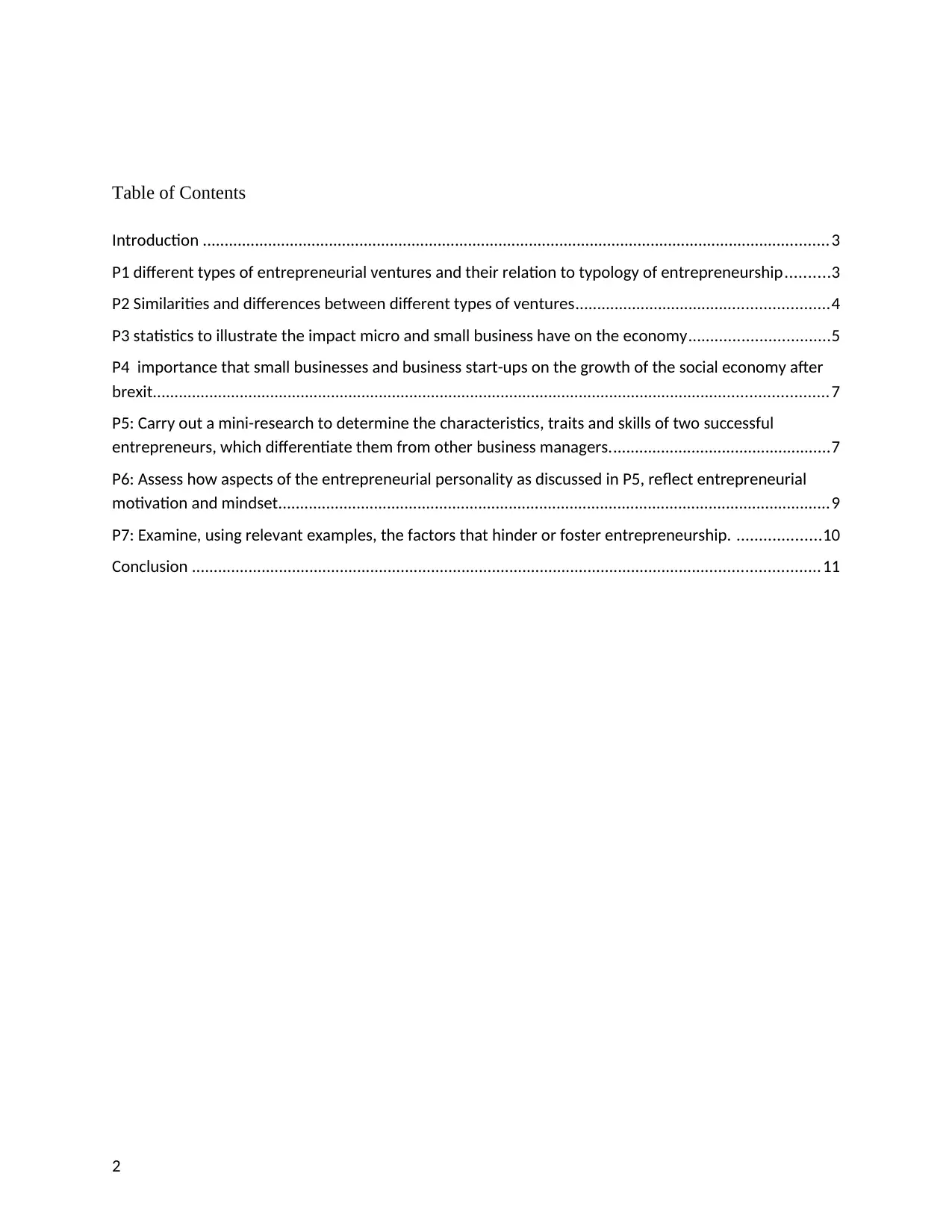
Table of Contents
Introduction ................................................................................................................................................3
P1 different types of entrepreneurial ventures and their relation to typology of entrepreneurship..........3
P2 Similarities and differences between different types of ventures..........................................................4
P3 statistics to illustrate the impact micro and small business have on the economy................................5
P4 importance that small businesses and business start-ups on the growth of the social economy after
brexit...........................................................................................................................................................7
P5: Carry out a mini-research to determine the characteristics, traits and skills of two successful
entrepreneurs, which differentiate them from other business managers...................................................7
P6: Assess how aspects of the entrepreneurial personality as discussed in P5, reflect entrepreneurial
motivation and mindset...............................................................................................................................9
P7: Examine, using relevant examples, the factors that hinder or foster entrepreneurship. ...................10
Conclusion ................................................................................................................................................11
2
Introduction ................................................................................................................................................3
P1 different types of entrepreneurial ventures and their relation to typology of entrepreneurship..........3
P2 Similarities and differences between different types of ventures..........................................................4
P3 statistics to illustrate the impact micro and small business have on the economy................................5
P4 importance that small businesses and business start-ups on the growth of the social economy after
brexit...........................................................................................................................................................7
P5: Carry out a mini-research to determine the characteristics, traits and skills of two successful
entrepreneurs, which differentiate them from other business managers...................................................7
P6: Assess how aspects of the entrepreneurial personality as discussed in P5, reflect entrepreneurial
motivation and mindset...............................................................................................................................9
P7: Examine, using relevant examples, the factors that hinder or foster entrepreneurship. ...................10
Conclusion ................................................................................................................................................11
2
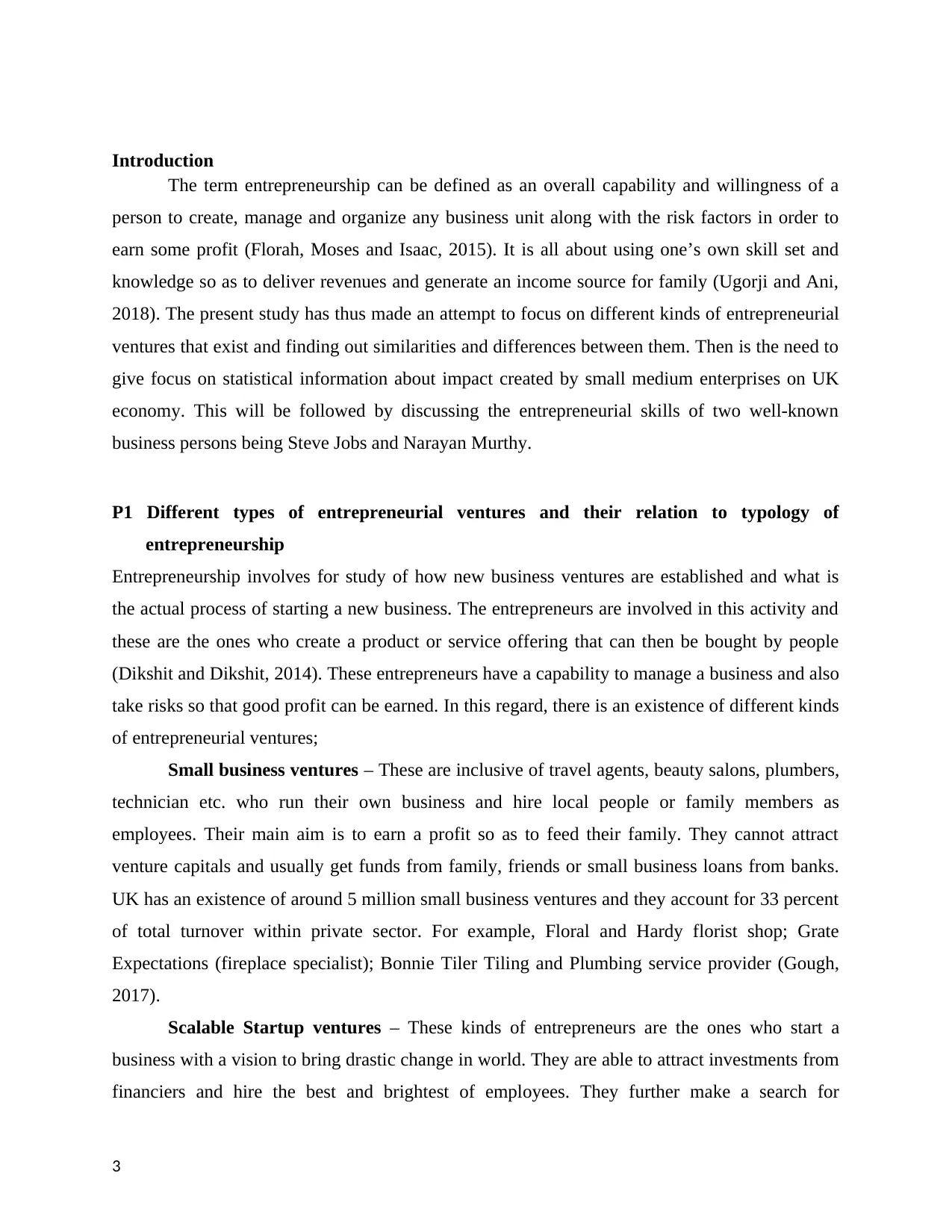
Introduction
The term entrepreneurship can be defined as an overall capability and willingness of a
person to create, manage and organize any business unit along with the risk factors in order to
earn some profit (Florah, Moses and Isaac, 2015). It is all about using one’s own skill set and
knowledge so as to deliver revenues and generate an income source for family (Ugorji and Ani,
2018). The present study has thus made an attempt to focus on different kinds of entrepreneurial
ventures that exist and finding out similarities and differences between them. Then is the need to
give focus on statistical information about impact created by small medium enterprises on UK
economy. This will be followed by discussing the entrepreneurial skills of two well-known
business persons being Steve Jobs and Narayan Murthy.
P1 Different types of entrepreneurial ventures and their relation to typology of
entrepreneurship
Entrepreneurship involves for study of how new business ventures are established and what is
the actual process of starting a new business. The entrepreneurs are involved in this activity and
these are the ones who create a product or service offering that can then be bought by people
(Dikshit and Dikshit, 2014). These entrepreneurs have a capability to manage a business and also
take risks so that good profit can be earned. In this regard, there is an existence of different kinds
of entrepreneurial ventures;
Small business ventures – These are inclusive of travel agents, beauty salons, plumbers,
technician etc. who run their own business and hire local people or family members as
employees. Their main aim is to earn a profit so as to feed their family. They cannot attract
venture capitals and usually get funds from family, friends or small business loans from banks.
UK has an existence of around 5 million small business ventures and they account for 33 percent
of total turnover within private sector. For example, Floral and Hardy florist shop; Grate
Expectations (fireplace specialist); Bonnie Tiler Tiling and Plumbing service provider (Gough,
2017).
Scalable Startup ventures – These kinds of entrepreneurs are the ones who start a
business with a vision to bring drastic change in world. They are able to attract investments from
financiers and hire the best and brightest of employees. They further make a search for
3
The term entrepreneurship can be defined as an overall capability and willingness of a
person to create, manage and organize any business unit along with the risk factors in order to
earn some profit (Florah, Moses and Isaac, 2015). It is all about using one’s own skill set and
knowledge so as to deliver revenues and generate an income source for family (Ugorji and Ani,
2018). The present study has thus made an attempt to focus on different kinds of entrepreneurial
ventures that exist and finding out similarities and differences between them. Then is the need to
give focus on statistical information about impact created by small medium enterprises on UK
economy. This will be followed by discussing the entrepreneurial skills of two well-known
business persons being Steve Jobs and Narayan Murthy.
P1 Different types of entrepreneurial ventures and their relation to typology of
entrepreneurship
Entrepreneurship involves for study of how new business ventures are established and what is
the actual process of starting a new business. The entrepreneurs are involved in this activity and
these are the ones who create a product or service offering that can then be bought by people
(Dikshit and Dikshit, 2014). These entrepreneurs have a capability to manage a business and also
take risks so that good profit can be earned. In this regard, there is an existence of different kinds
of entrepreneurial ventures;
Small business ventures – These are inclusive of travel agents, beauty salons, plumbers,
technician etc. who run their own business and hire local people or family members as
employees. Their main aim is to earn a profit so as to feed their family. They cannot attract
venture capitals and usually get funds from family, friends or small business loans from banks.
UK has an existence of around 5 million small business ventures and they account for 33 percent
of total turnover within private sector. For example, Floral and Hardy florist shop; Grate
Expectations (fireplace specialist); Bonnie Tiler Tiling and Plumbing service provider (Gough,
2017).
Scalable Startup ventures – These kinds of entrepreneurs are the ones who start a
business with a vision to bring drastic change in world. They are able to attract investments from
financiers and hire the best and brightest of employees. They further make a search for
3
⊘ This is a preview!⊘
Do you want full access?
Subscribe today to unlock all pages.

Trusted by 1+ million students worldwide
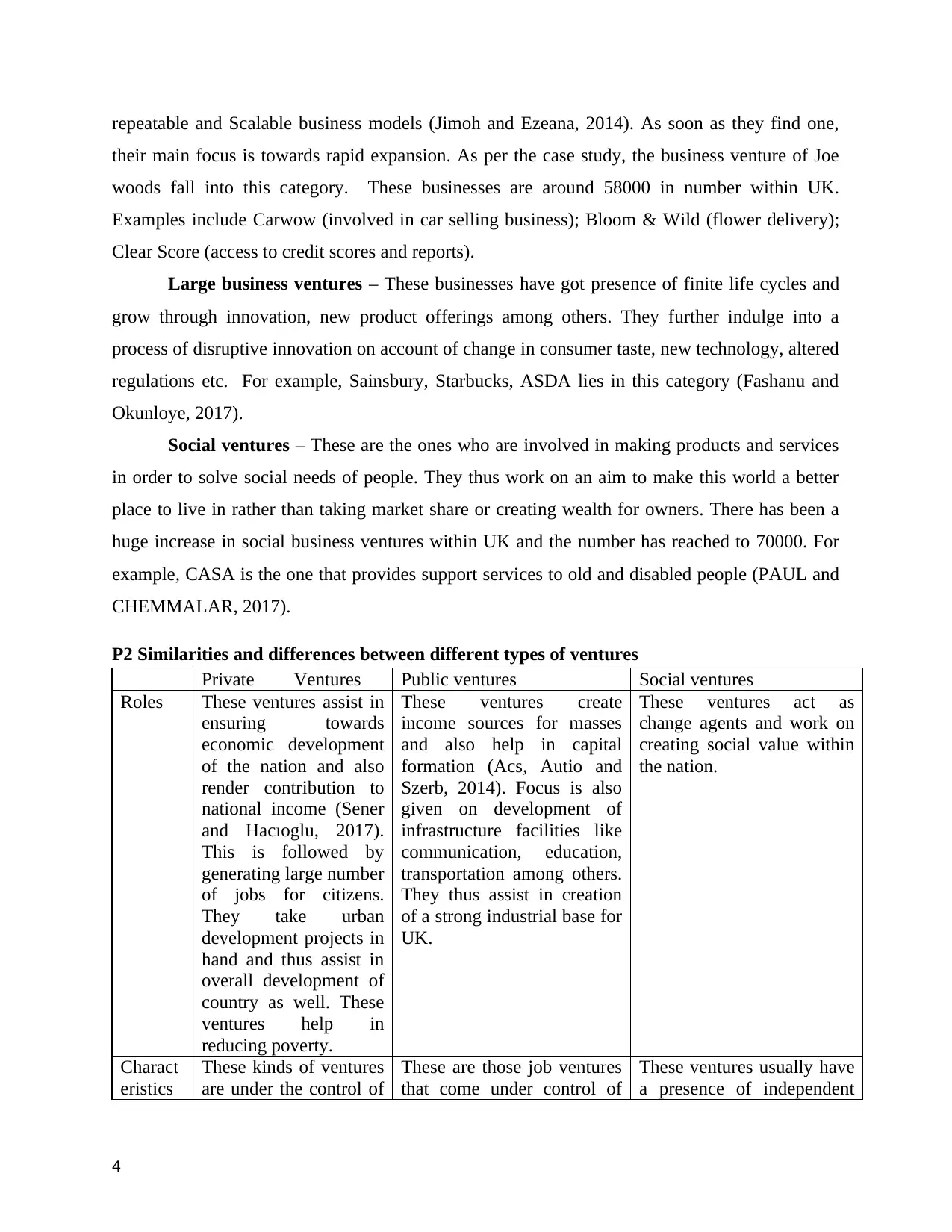
repeatable and Scalable business models (Jimoh and Ezeana, 2014). As soon as they find one,
their main focus is towards rapid expansion. As per the case study, the business venture of Joe
woods fall into this category. These businesses are around 58000 in number within UK.
Examples include Carwow (involved in car selling business); Bloom & Wild (flower delivery);
Clear Score (access to credit scores and reports).
Large business ventures – These businesses have got presence of finite life cycles and
grow through innovation, new product offerings among others. They further indulge into a
process of disruptive innovation on account of change in consumer taste, new technology, altered
regulations etc. For example, Sainsbury, Starbucks, ASDA lies in this category (Fashanu and
Okunloye, 2017).
Social ventures – These are the ones who are involved in making products and services
in order to solve social needs of people. They thus work on an aim to make this world a better
place to live in rather than taking market share or creating wealth for owners. There has been a
huge increase in social business ventures within UK and the number has reached to 70000. For
example, CASA is the one that provides support services to old and disabled people (PAUL and
CHEMMALAR, 2017).
P2 Similarities and differences between different types of ventures
Private Ventures Public ventures Social ventures
Roles These ventures assist in
ensuring towards
economic development
of the nation and also
render contribution to
national income (Sener
and Hacıoglu, 2017).
This is followed by
generating large number
of jobs for citizens.
They take urban
development projects in
hand and thus assist in
overall development of
country as well. These
ventures help in
reducing poverty.
These ventures create
income sources for masses
and also help in capital
formation (Acs, Autio and
Szerb, 2014). Focus is also
given on development of
infrastructure facilities like
communication, education,
transportation among others.
They thus assist in creation
of a strong industrial base for
UK.
These ventures act as
change agents and work on
creating social value within
the nation.
Charact
eristics
These kinds of ventures
are under the control of
These are those job ventures
that come under control of
These ventures usually have
a presence of independent
4
their main focus is towards rapid expansion. As per the case study, the business venture of Joe
woods fall into this category. These businesses are around 58000 in number within UK.
Examples include Carwow (involved in car selling business); Bloom & Wild (flower delivery);
Clear Score (access to credit scores and reports).
Large business ventures – These businesses have got presence of finite life cycles and
grow through innovation, new product offerings among others. They further indulge into a
process of disruptive innovation on account of change in consumer taste, new technology, altered
regulations etc. For example, Sainsbury, Starbucks, ASDA lies in this category (Fashanu and
Okunloye, 2017).
Social ventures – These are the ones who are involved in making products and services
in order to solve social needs of people. They thus work on an aim to make this world a better
place to live in rather than taking market share or creating wealth for owners. There has been a
huge increase in social business ventures within UK and the number has reached to 70000. For
example, CASA is the one that provides support services to old and disabled people (PAUL and
CHEMMALAR, 2017).
P2 Similarities and differences between different types of ventures
Private Ventures Public ventures Social ventures
Roles These ventures assist in
ensuring towards
economic development
of the nation and also
render contribution to
national income (Sener
and Hacıoglu, 2017).
This is followed by
generating large number
of jobs for citizens.
They take urban
development projects in
hand and thus assist in
overall development of
country as well. These
ventures help in
reducing poverty.
These ventures create
income sources for masses
and also help in capital
formation (Acs, Autio and
Szerb, 2014). Focus is also
given on development of
infrastructure facilities like
communication, education,
transportation among others.
They thus assist in creation
of a strong industrial base for
UK.
These ventures act as
change agents and work on
creating social value within
the nation.
Charact
eristics
These kinds of ventures
are under the control of
These are those job ventures
that come under control of
These ventures usually have
a presence of independent
4
Paraphrase This Document
Need a fresh take? Get an instant paraphrase of this document with our AI Paraphraser
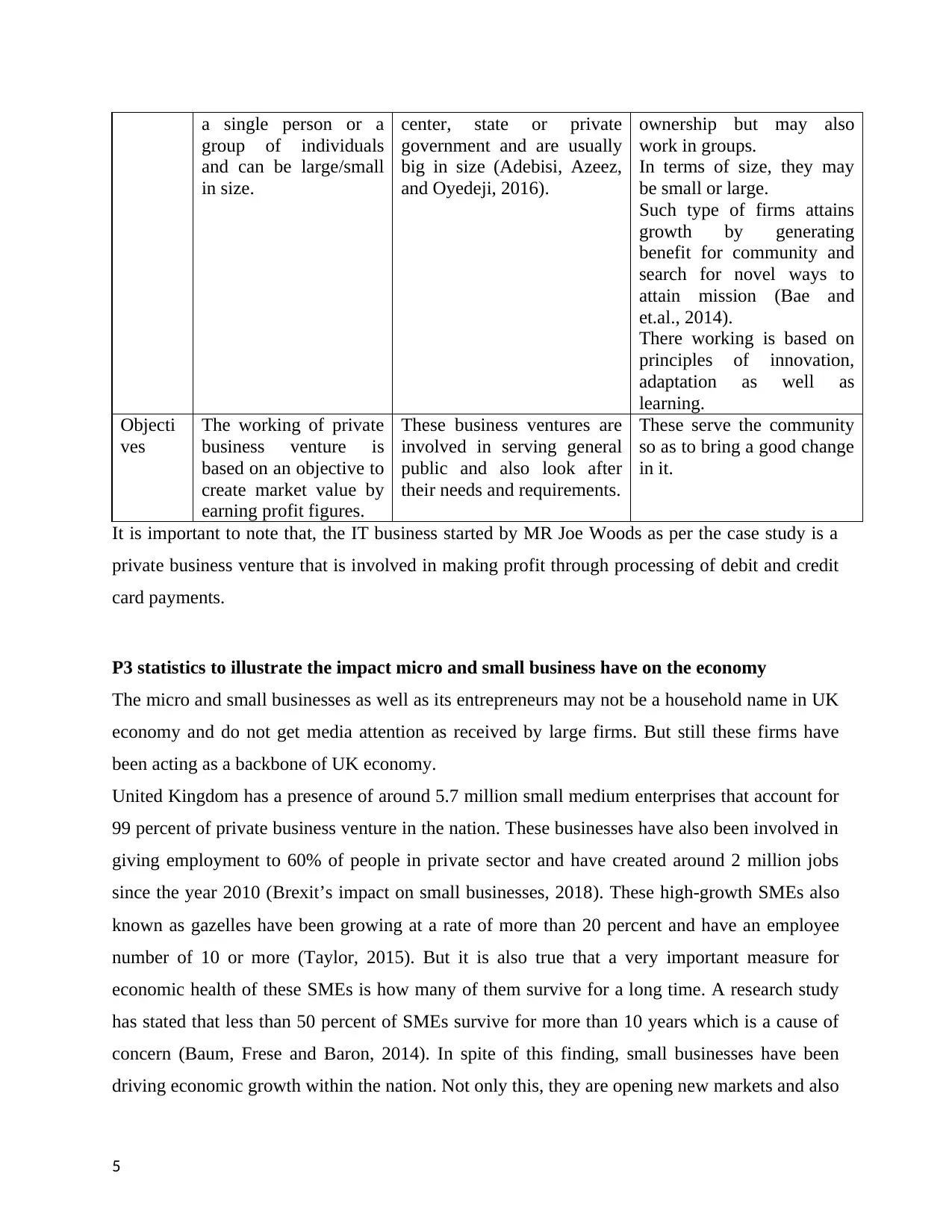
a single person or a
group of individuals
and can be large/small
in size.
center, state or private
government and are usually
big in size (Adebisi, Azeez,
and Oyedeji, 2016).
ownership but may also
work in groups.
In terms of size, they may
be small or large.
Such type of firms attains
growth by generating
benefit for community and
search for novel ways to
attain mission (Bae and
et.al., 2014).
There working is based on
principles of innovation,
adaptation as well as
learning.
Objecti
ves
The working of private
business venture is
based on an objective to
create market value by
earning profit figures.
These business ventures are
involved in serving general
public and also look after
their needs and requirements.
These serve the community
so as to bring a good change
in it.
It is important to note that, the IT business started by MR Joe Woods as per the case study is a
private business venture that is involved in making profit through processing of debit and credit
card payments.
P3 statistics to illustrate the impact micro and small business have on the economy
The micro and small businesses as well as its entrepreneurs may not be a household name in UK
economy and do not get media attention as received by large firms. But still these firms have
been acting as a backbone of UK economy.
United Kingdom has a presence of around 5.7 million small medium enterprises that account for
99 percent of private business venture in the nation. These businesses have also been involved in
giving employment to 60% of people in private sector and have created around 2 million jobs
since the year 2010 (Brexit’s impact on small businesses, 2018). These high-growth SMEs also
known as gazelles have been growing at a rate of more than 20 percent and have an employee
number of 10 or more (Taylor, 2015). But it is also true that a very important measure for
economic health of these SMEs is how many of them survive for a long time. A research study
has stated that less than 50 percent of SMEs survive for more than 10 years which is a cause of
concern (Baum, Frese and Baron, 2014). In spite of this finding, small businesses have been
driving economic growth within the nation. Not only this, they are opening new markets and also
5
group of individuals
and can be large/small
in size.
center, state or private
government and are usually
big in size (Adebisi, Azeez,
and Oyedeji, 2016).
ownership but may also
work in groups.
In terms of size, they may
be small or large.
Such type of firms attains
growth by generating
benefit for community and
search for novel ways to
attain mission (Bae and
et.al., 2014).
There working is based on
principles of innovation,
adaptation as well as
learning.
Objecti
ves
The working of private
business venture is
based on an objective to
create market value by
earning profit figures.
These business ventures are
involved in serving general
public and also look after
their needs and requirements.
These serve the community
so as to bring a good change
in it.
It is important to note that, the IT business started by MR Joe Woods as per the case study is a
private business venture that is involved in making profit through processing of debit and credit
card payments.
P3 statistics to illustrate the impact micro and small business have on the economy
The micro and small businesses as well as its entrepreneurs may not be a household name in UK
economy and do not get media attention as received by large firms. But still these firms have
been acting as a backbone of UK economy.
United Kingdom has a presence of around 5.7 million small medium enterprises that account for
99 percent of private business venture in the nation. These businesses have also been involved in
giving employment to 60% of people in private sector and have created around 2 million jobs
since the year 2010 (Brexit’s impact on small businesses, 2018). These high-growth SMEs also
known as gazelles have been growing at a rate of more than 20 percent and have an employee
number of 10 or more (Taylor, 2015). But it is also true that a very important measure for
economic health of these SMEs is how many of them survive for a long time. A research study
has stated that less than 50 percent of SMEs survive for more than 10 years which is a cause of
concern (Baum, Frese and Baron, 2014). In spite of this finding, small businesses have been
driving economic growth within the nation. Not only this, they are opening new markets and also
5
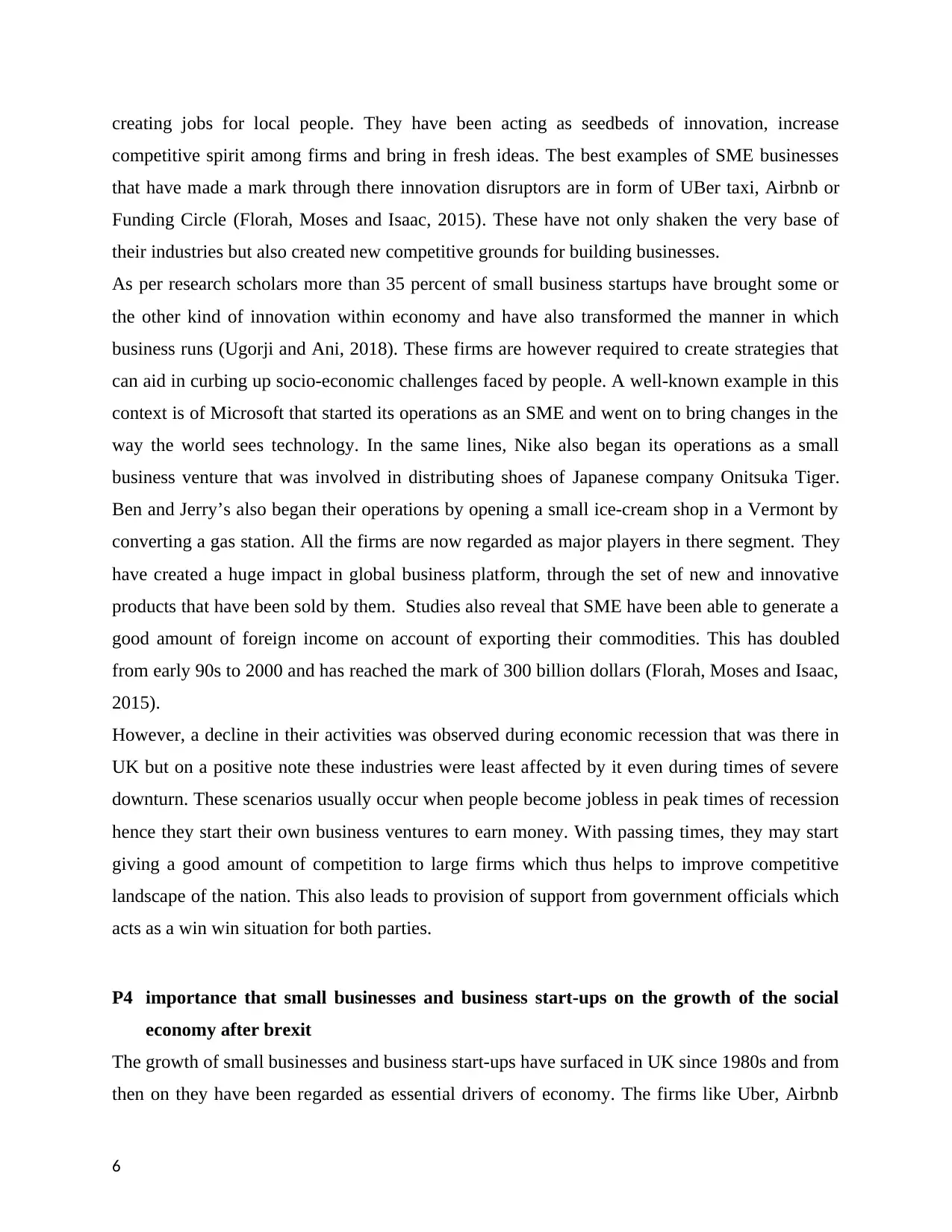
creating jobs for local people. They have been acting as seedbeds of innovation, increase
competitive spirit among firms and bring in fresh ideas. The best examples of SME businesses
that have made a mark through there innovation disruptors are in form of UBer taxi, Airbnb or
Funding Circle (Florah, Moses and Isaac, 2015). These have not only shaken the very base of
their industries but also created new competitive grounds for building businesses.
As per research scholars more than 35 percent of small business startups have brought some or
the other kind of innovation within economy and have also transformed the manner in which
business runs (Ugorji and Ani, 2018). These firms are however required to create strategies that
can aid in curbing up socio-economic challenges faced by people. A well-known example in this
context is of Microsoft that started its operations as an SME and went on to bring changes in the
way the world sees technology. In the same lines, Nike also began its operations as a small
business venture that was involved in distributing shoes of Japanese company Onitsuka Tiger.
Ben and Jerry’s also began their operations by opening a small ice-cream shop in a Vermont by
converting a gas station. All the firms are now regarded as major players in there segment. They
have created a huge impact in global business platform, through the set of new and innovative
products that have been sold by them. Studies also reveal that SME have been able to generate a
good amount of foreign income on account of exporting their commodities. This has doubled
from early 90s to 2000 and has reached the mark of 300 billion dollars (Florah, Moses and Isaac,
2015).
However, a decline in their activities was observed during economic recession that was there in
UK but on a positive note these industries were least affected by it even during times of severe
downturn. These scenarios usually occur when people become jobless in peak times of recession
hence they start their own business ventures to earn money. With passing times, they may start
giving a good amount of competition to large firms which thus helps to improve competitive
landscape of the nation. This also leads to provision of support from government officials which
acts as a win win situation for both parties.
P4 importance that small businesses and business start-ups on the growth of the social
economy after brexit
The growth of small businesses and business start-ups have surfaced in UK since 1980s and from
then on they have been regarded as essential drivers of economy. The firms like Uber, Airbnb
6
competitive spirit among firms and bring in fresh ideas. The best examples of SME businesses
that have made a mark through there innovation disruptors are in form of UBer taxi, Airbnb or
Funding Circle (Florah, Moses and Isaac, 2015). These have not only shaken the very base of
their industries but also created new competitive grounds for building businesses.
As per research scholars more than 35 percent of small business startups have brought some or
the other kind of innovation within economy and have also transformed the manner in which
business runs (Ugorji and Ani, 2018). These firms are however required to create strategies that
can aid in curbing up socio-economic challenges faced by people. A well-known example in this
context is of Microsoft that started its operations as an SME and went on to bring changes in the
way the world sees technology. In the same lines, Nike also began its operations as a small
business venture that was involved in distributing shoes of Japanese company Onitsuka Tiger.
Ben and Jerry’s also began their operations by opening a small ice-cream shop in a Vermont by
converting a gas station. All the firms are now regarded as major players in there segment. They
have created a huge impact in global business platform, through the set of new and innovative
products that have been sold by them. Studies also reveal that SME have been able to generate a
good amount of foreign income on account of exporting their commodities. This has doubled
from early 90s to 2000 and has reached the mark of 300 billion dollars (Florah, Moses and Isaac,
2015).
However, a decline in their activities was observed during economic recession that was there in
UK but on a positive note these industries were least affected by it even during times of severe
downturn. These scenarios usually occur when people become jobless in peak times of recession
hence they start their own business ventures to earn money. With passing times, they may start
giving a good amount of competition to large firms which thus helps to improve competitive
landscape of the nation. This also leads to provision of support from government officials which
acts as a win win situation for both parties.
P4 importance that small businesses and business start-ups on the growth of the social
economy after brexit
The growth of small businesses and business start-ups have surfaced in UK since 1980s and from
then on they have been regarded as essential drivers of economy. The firms like Uber, Airbnb
6
⊘ This is a preview!⊘
Do you want full access?
Subscribe today to unlock all pages.

Trusted by 1+ million students worldwide
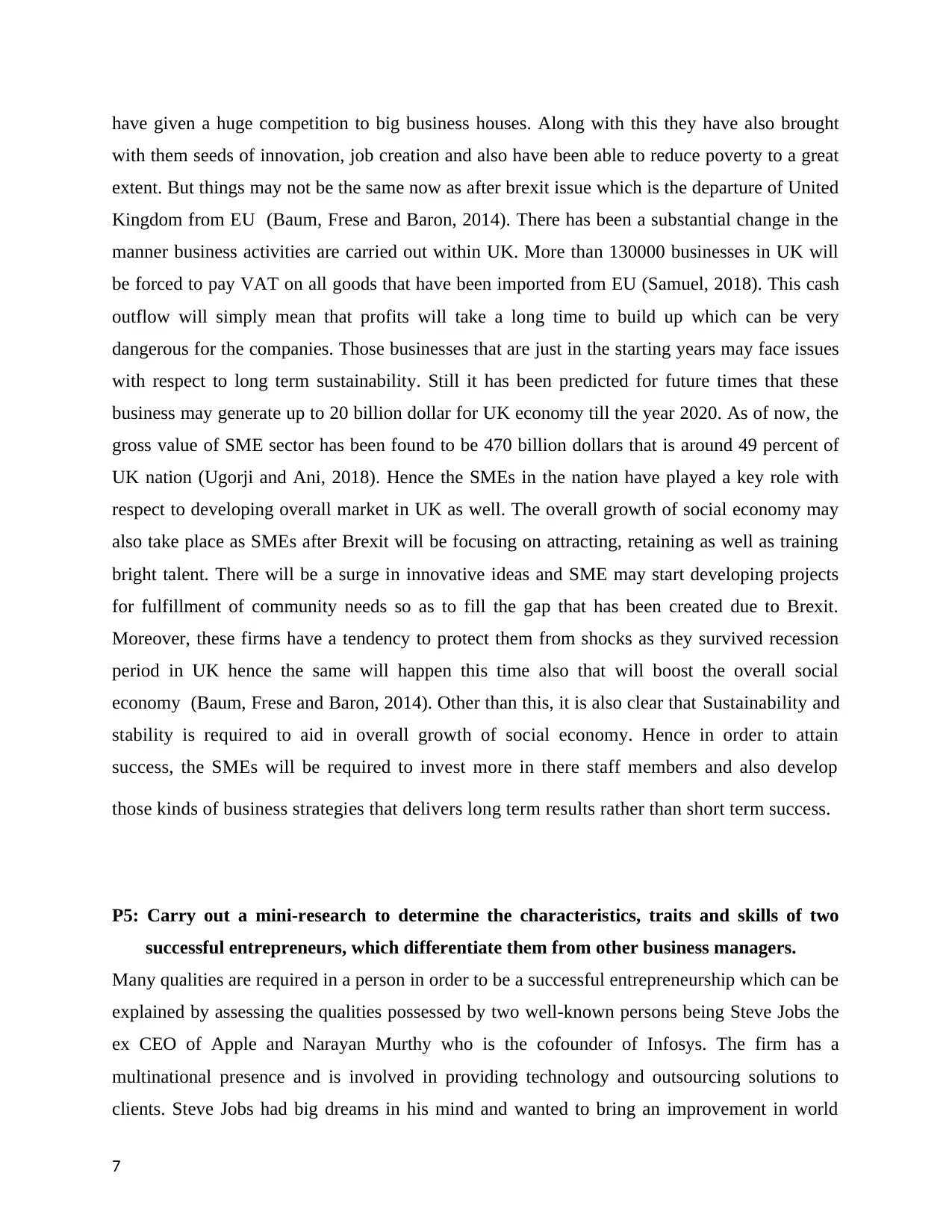
have given a huge competition to big business houses. Along with this they have also brought
with them seeds of innovation, job creation and also have been able to reduce poverty to a great
extent. But things may not be the same now as after brexit issue which is the departure of United
Kingdom from EU (Baum, Frese and Baron, 2014). There has been a substantial change in the
manner business activities are carried out within UK. More than 130000 businesses in UK will
be forced to pay VAT on all goods that have been imported from EU (Samuel, 2018). This cash
outflow will simply mean that profits will take a long time to build up which can be very
dangerous for the companies. Those businesses that are just in the starting years may face issues
with respect to long term sustainability. Still it has been predicted for future times that these
business may generate up to 20 billion dollar for UK economy till the year 2020. As of now, the
gross value of SME sector has been found to be 470 billion dollars that is around 49 percent of
UK nation (Ugorji and Ani, 2018). Hence the SMEs in the nation have played a key role with
respect to developing overall market in UK as well. The overall growth of social economy may
also take place as SMEs after Brexit will be focusing on attracting, retaining as well as training
bright talent. There will be a surge in innovative ideas and SME may start developing projects
for fulfillment of community needs so as to fill the gap that has been created due to Brexit.
Moreover, these firms have a tendency to protect them from shocks as they survived recession
period in UK hence the same will happen this time also that will boost the overall social
economy (Baum, Frese and Baron, 2014). Other than this, it is also clear that Sustainability and
stability is required to aid in overall growth of social economy. Hence in order to attain
success, the SMEs will be required to invest more in there staff members and also develop
those kinds of business strategies that delivers long term results rather than short term success.
P5: Carry out a mini-research to determine the characteristics, traits and skills of two
successful entrepreneurs, which differentiate them from other business managers.
Many qualities are required in a person in order to be a successful entrepreneurship which can be
explained by assessing the qualities possessed by two well-known persons being Steve Jobs the
ex CEO of Apple and Narayan Murthy who is the cofounder of Infosys. The firm has a
multinational presence and is involved in providing technology and outsourcing solutions to
clients. Steve Jobs had big dreams in his mind and wanted to bring an improvement in world
7
with them seeds of innovation, job creation and also have been able to reduce poverty to a great
extent. But things may not be the same now as after brexit issue which is the departure of United
Kingdom from EU (Baum, Frese and Baron, 2014). There has been a substantial change in the
manner business activities are carried out within UK. More than 130000 businesses in UK will
be forced to pay VAT on all goods that have been imported from EU (Samuel, 2018). This cash
outflow will simply mean that profits will take a long time to build up which can be very
dangerous for the companies. Those businesses that are just in the starting years may face issues
with respect to long term sustainability. Still it has been predicted for future times that these
business may generate up to 20 billion dollar for UK economy till the year 2020. As of now, the
gross value of SME sector has been found to be 470 billion dollars that is around 49 percent of
UK nation (Ugorji and Ani, 2018). Hence the SMEs in the nation have played a key role with
respect to developing overall market in UK as well. The overall growth of social economy may
also take place as SMEs after Brexit will be focusing on attracting, retaining as well as training
bright talent. There will be a surge in innovative ideas and SME may start developing projects
for fulfillment of community needs so as to fill the gap that has been created due to Brexit.
Moreover, these firms have a tendency to protect them from shocks as they survived recession
period in UK hence the same will happen this time also that will boost the overall social
economy (Baum, Frese and Baron, 2014). Other than this, it is also clear that Sustainability and
stability is required to aid in overall growth of social economy. Hence in order to attain
success, the SMEs will be required to invest more in there staff members and also develop
those kinds of business strategies that delivers long term results rather than short term success.
P5: Carry out a mini-research to determine the characteristics, traits and skills of two
successful entrepreneurs, which differentiate them from other business managers.
Many qualities are required in a person in order to be a successful entrepreneurship which can be
explained by assessing the qualities possessed by two well-known persons being Steve Jobs the
ex CEO of Apple and Narayan Murthy who is the cofounder of Infosys. The firm has a
multinational presence and is involved in providing technology and outsourcing solutions to
clients. Steve Jobs had big dreams in his mind and wanted to bring an improvement in world
7
Paraphrase This Document
Need a fresh take? Get an instant paraphrase of this document with our AI Paraphraser
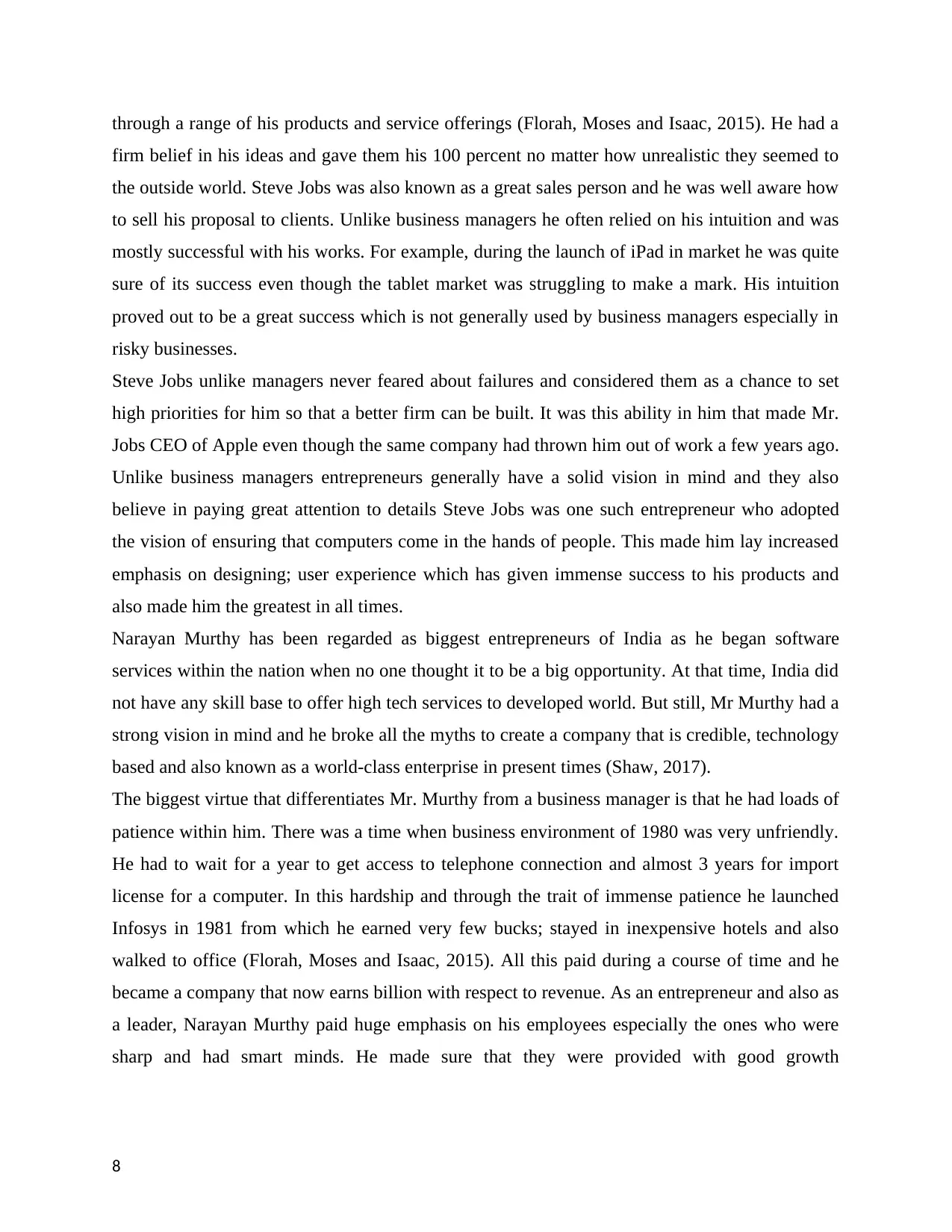
through a range of his products and service offerings (Florah, Moses and Isaac, 2015). He had a
firm belief in his ideas and gave them his 100 percent no matter how unrealistic they seemed to
the outside world. Steve Jobs was also known as a great sales person and he was well aware how
to sell his proposal to clients. Unlike business managers he often relied on his intuition and was
mostly successful with his works. For example, during the launch of iPad in market he was quite
sure of its success even though the tablet market was struggling to make a mark. His intuition
proved out to be a great success which is not generally used by business managers especially in
risky businesses.
Steve Jobs unlike managers never feared about failures and considered them as a chance to set
high priorities for him so that a better firm can be built. It was this ability in him that made Mr.
Jobs CEO of Apple even though the same company had thrown him out of work a few years ago.
Unlike business managers entrepreneurs generally have a solid vision in mind and they also
believe in paying great attention to details Steve Jobs was one such entrepreneur who adopted
the vision of ensuring that computers come in the hands of people. This made him lay increased
emphasis on designing; user experience which has given immense success to his products and
also made him the greatest in all times.
Narayan Murthy has been regarded as biggest entrepreneurs of India as he began software
services within the nation when no one thought it to be a big opportunity. At that time, India did
not have any skill base to offer high tech services to developed world. But still, Mr Murthy had a
strong vision in mind and he broke all the myths to create a company that is credible, technology
based and also known as a world-class enterprise in present times (Shaw, 2017).
The biggest virtue that differentiates Mr. Murthy from a business manager is that he had loads of
patience within him. There was a time when business environment of 1980 was very unfriendly.
He had to wait for a year to get access to telephone connection and almost 3 years for import
license for a computer. In this hardship and through the trait of immense patience he launched
Infosys in 1981 from which he earned very few bucks; stayed in inexpensive hotels and also
walked to office (Florah, Moses and Isaac, 2015). All this paid during a course of time and he
became a company that now earns billion with respect to revenue. As an entrepreneur and also as
a leader, Narayan Murthy paid huge emphasis on his employees especially the ones who were
sharp and had smart minds. He made sure that they were provided with good growth
8
firm belief in his ideas and gave them his 100 percent no matter how unrealistic they seemed to
the outside world. Steve Jobs was also known as a great sales person and he was well aware how
to sell his proposal to clients. Unlike business managers he often relied on his intuition and was
mostly successful with his works. For example, during the launch of iPad in market he was quite
sure of its success even though the tablet market was struggling to make a mark. His intuition
proved out to be a great success which is not generally used by business managers especially in
risky businesses.
Steve Jobs unlike managers never feared about failures and considered them as a chance to set
high priorities for him so that a better firm can be built. It was this ability in him that made Mr.
Jobs CEO of Apple even though the same company had thrown him out of work a few years ago.
Unlike business managers entrepreneurs generally have a solid vision in mind and they also
believe in paying great attention to details Steve Jobs was one such entrepreneur who adopted
the vision of ensuring that computers come in the hands of people. This made him lay increased
emphasis on designing; user experience which has given immense success to his products and
also made him the greatest in all times.
Narayan Murthy has been regarded as biggest entrepreneurs of India as he began software
services within the nation when no one thought it to be a big opportunity. At that time, India did
not have any skill base to offer high tech services to developed world. But still, Mr Murthy had a
strong vision in mind and he broke all the myths to create a company that is credible, technology
based and also known as a world-class enterprise in present times (Shaw, 2017).
The biggest virtue that differentiates Mr. Murthy from a business manager is that he had loads of
patience within him. There was a time when business environment of 1980 was very unfriendly.
He had to wait for a year to get access to telephone connection and almost 3 years for import
license for a computer. In this hardship and through the trait of immense patience he launched
Infosys in 1981 from which he earned very few bucks; stayed in inexpensive hotels and also
walked to office (Florah, Moses and Isaac, 2015). All this paid during a course of time and he
became a company that now earns billion with respect to revenue. As an entrepreneur and also as
a leader, Narayan Murthy paid huge emphasis on his employees especially the ones who were
sharp and had smart minds. He made sure that they were provided with good growth
8
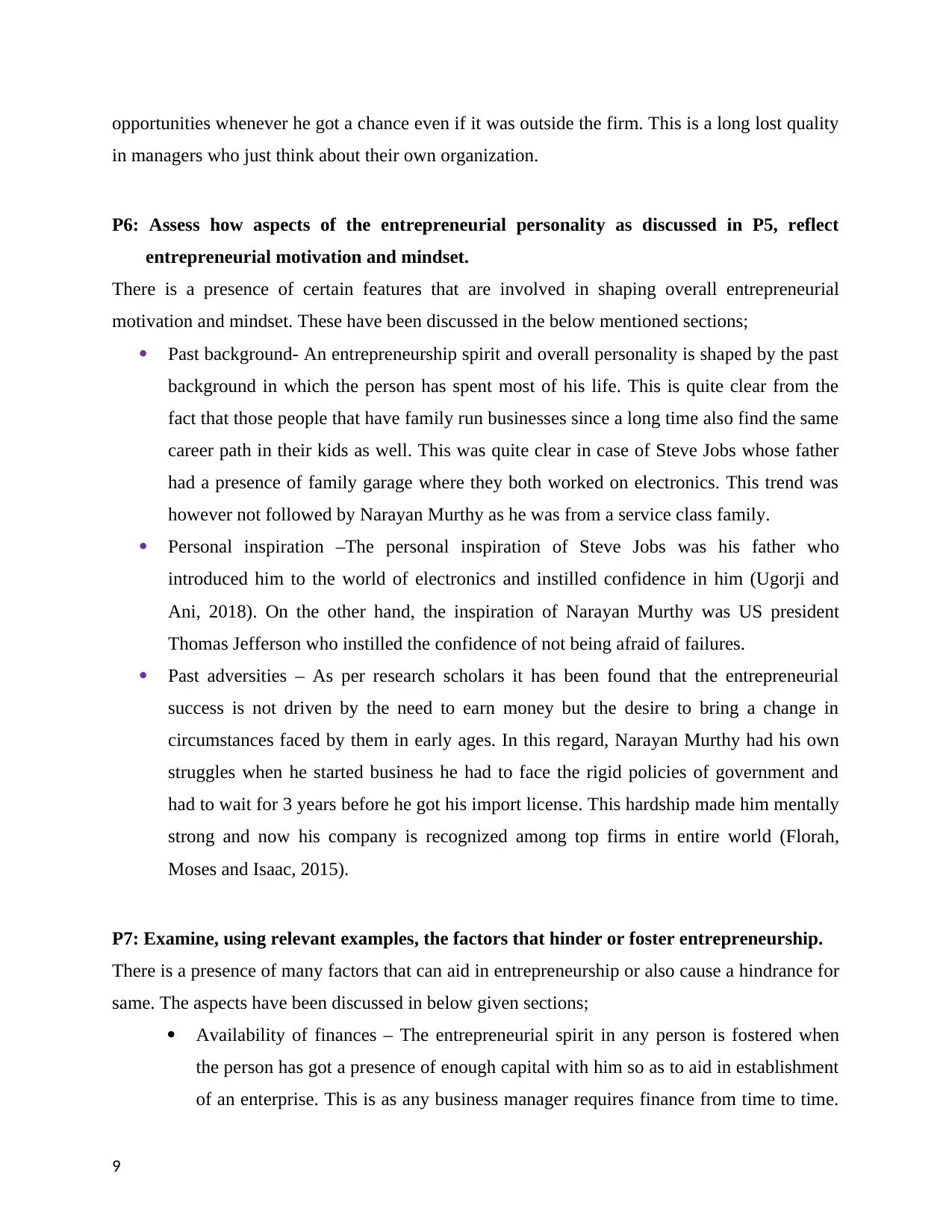
opportunities whenever he got a chance even if it was outside the firm. This is a long lost quality
in managers who just think about their own organization.
P6: Assess how aspects of the entrepreneurial personality as discussed in P5, reflect
entrepreneurial motivation and mindset.
There is a presence of certain features that are involved in shaping overall entrepreneurial
motivation and mindset. These have been discussed in the below mentioned sections;
Past background- An entrepreneurship spirit and overall personality is shaped by the past
background in which the person has spent most of his life. This is quite clear from the
fact that those people that have family run businesses since a long time also find the same
career path in their kids as well. This was quite clear in case of Steve Jobs whose father
had a presence of family garage where they both worked on electronics. This trend was
however not followed by Narayan Murthy as he was from a service class family.
Personal inspiration –The personal inspiration of Steve Jobs was his father who
introduced him to the world of electronics and instilled confidence in him (Ugorji and
Ani, 2018). On the other hand, the inspiration of Narayan Murthy was US president
Thomas Jefferson who instilled the confidence of not being afraid of failures.
Past adversities – As per research scholars it has been found that the entrepreneurial
success is not driven by the need to earn money but the desire to bring a change in
circumstances faced by them in early ages. In this regard, Narayan Murthy had his own
struggles when he started business he had to face the rigid policies of government and
had to wait for 3 years before he got his import license. This hardship made him mentally
strong and now his company is recognized among top firms in entire world (Florah,
Moses and Isaac, 2015).
P7: Examine, using relevant examples, the factors that hinder or foster entrepreneurship.
There is a presence of many factors that can aid in entrepreneurship or also cause a hindrance for
same. The aspects have been discussed in below given sections;
Availability of finances – The entrepreneurial spirit in any person is fostered when
the person has got a presence of enough capital with him so as to aid in establishment
of an enterprise. This is as any business manager requires finance from time to time.
9
in managers who just think about their own organization.
P6: Assess how aspects of the entrepreneurial personality as discussed in P5, reflect
entrepreneurial motivation and mindset.
There is a presence of certain features that are involved in shaping overall entrepreneurial
motivation and mindset. These have been discussed in the below mentioned sections;
Past background- An entrepreneurship spirit and overall personality is shaped by the past
background in which the person has spent most of his life. This is quite clear from the
fact that those people that have family run businesses since a long time also find the same
career path in their kids as well. This was quite clear in case of Steve Jobs whose father
had a presence of family garage where they both worked on electronics. This trend was
however not followed by Narayan Murthy as he was from a service class family.
Personal inspiration –The personal inspiration of Steve Jobs was his father who
introduced him to the world of electronics and instilled confidence in him (Ugorji and
Ani, 2018). On the other hand, the inspiration of Narayan Murthy was US president
Thomas Jefferson who instilled the confidence of not being afraid of failures.
Past adversities – As per research scholars it has been found that the entrepreneurial
success is not driven by the need to earn money but the desire to bring a change in
circumstances faced by them in early ages. In this regard, Narayan Murthy had his own
struggles when he started business he had to face the rigid policies of government and
had to wait for 3 years before he got his import license. This hardship made him mentally
strong and now his company is recognized among top firms in entire world (Florah,
Moses and Isaac, 2015).
P7: Examine, using relevant examples, the factors that hinder or foster entrepreneurship.
There is a presence of many factors that can aid in entrepreneurship or also cause a hindrance for
same. The aspects have been discussed in below given sections;
Availability of finances – The entrepreneurial spirit in any person is fostered when
the person has got a presence of enough capital with him so as to aid in establishment
of an enterprise. This is as any business manager requires finance from time to time.
9
⊘ This is a preview!⊘
Do you want full access?
Subscribe today to unlock all pages.

Trusted by 1+ million students worldwide
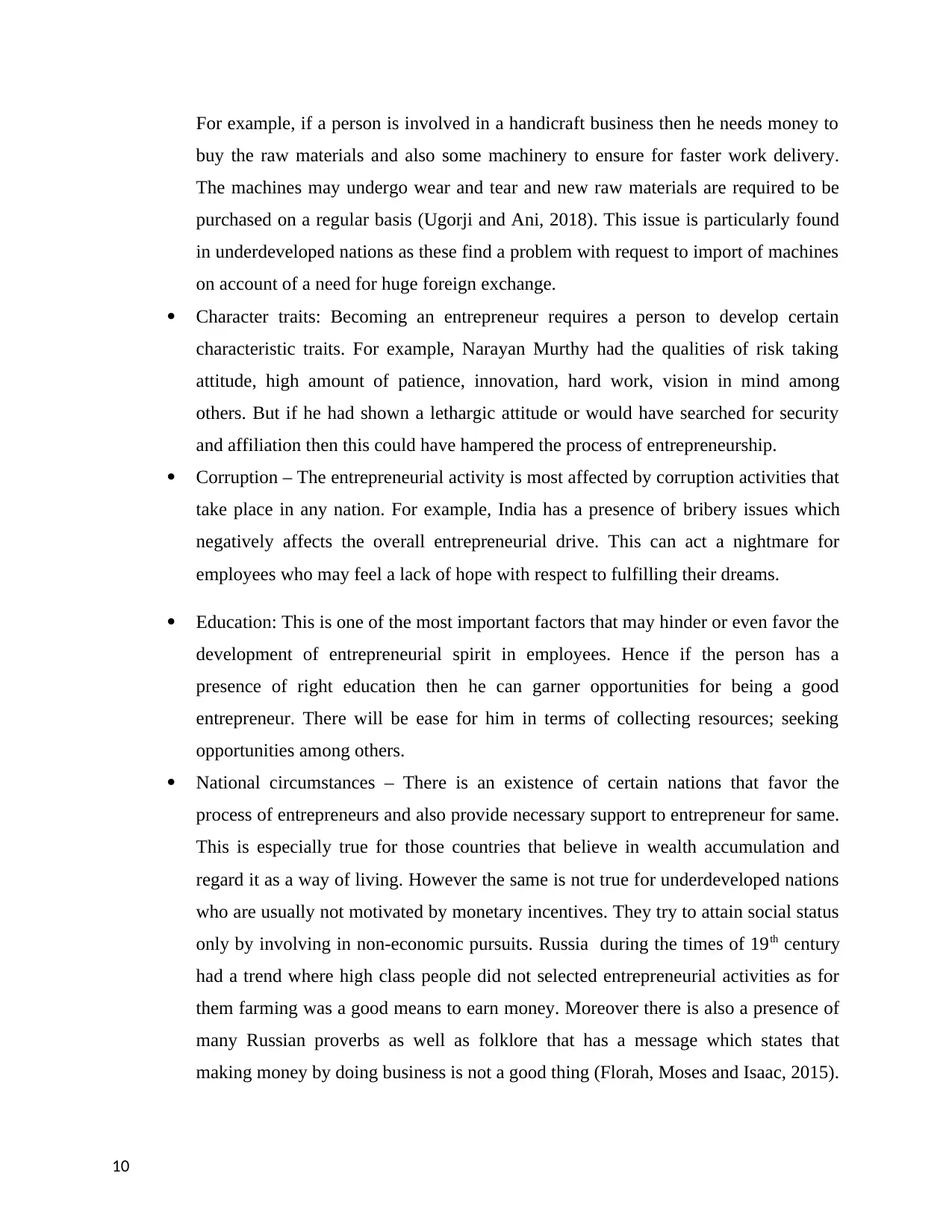
For example, if a person is involved in a handicraft business then he needs money to
buy the raw materials and also some machinery to ensure for faster work delivery.
The machines may undergo wear and tear and new raw materials are required to be
purchased on a regular basis (Ugorji and Ani, 2018). This issue is particularly found
in underdeveloped nations as these find a problem with request to import of machines
on account of a need for huge foreign exchange.
Character traits: Becoming an entrepreneur requires a person to develop certain
characteristic traits. For example, Narayan Murthy had the qualities of risk taking
attitude, high amount of patience, innovation, hard work, vision in mind among
others. But if he had shown a lethargic attitude or would have searched for security
and affiliation then this could have hampered the process of entrepreneurship.
Corruption – The entrepreneurial activity is most affected by corruption activities that
take place in any nation. For example, India has a presence of bribery issues which
negatively affects the overall entrepreneurial drive. This can act a nightmare for
employees who may feel a lack of hope with respect to fulfilling their dreams.
Education: This is one of the most important factors that may hinder or even favor the
development of entrepreneurial spirit in employees. Hence if the person has a
presence of right education then he can garner opportunities for being a good
entrepreneur. There will be ease for him in terms of collecting resources; seeking
opportunities among others.
National circumstances – There is an existence of certain nations that favor the
process of entrepreneurs and also provide necessary support to entrepreneur for same.
This is especially true for those countries that believe in wealth accumulation and
regard it as a way of living. However the same is not true for underdeveloped nations
who are usually not motivated by monetary incentives. They try to attain social status
only by involving in non-economic pursuits. Russia during the times of 19th century
had a trend where high class people did not selected entrepreneurial activities as for
them farming was a good means to earn money. Moreover there is also a presence of
many Russian proverbs as well as folklore that has a message which states that
making money by doing business is not a good thing (Florah, Moses and Isaac, 2015).
10
buy the raw materials and also some machinery to ensure for faster work delivery.
The machines may undergo wear and tear and new raw materials are required to be
purchased on a regular basis (Ugorji and Ani, 2018). This issue is particularly found
in underdeveloped nations as these find a problem with request to import of machines
on account of a need for huge foreign exchange.
Character traits: Becoming an entrepreneur requires a person to develop certain
characteristic traits. For example, Narayan Murthy had the qualities of risk taking
attitude, high amount of patience, innovation, hard work, vision in mind among
others. But if he had shown a lethargic attitude or would have searched for security
and affiliation then this could have hampered the process of entrepreneurship.
Corruption – The entrepreneurial activity is most affected by corruption activities that
take place in any nation. For example, India has a presence of bribery issues which
negatively affects the overall entrepreneurial drive. This can act a nightmare for
employees who may feel a lack of hope with respect to fulfilling their dreams.
Education: This is one of the most important factors that may hinder or even favor the
development of entrepreneurial spirit in employees. Hence if the person has a
presence of right education then he can garner opportunities for being a good
entrepreneur. There will be ease for him in terms of collecting resources; seeking
opportunities among others.
National circumstances – There is an existence of certain nations that favor the
process of entrepreneurs and also provide necessary support to entrepreneur for same.
This is especially true for those countries that believe in wealth accumulation and
regard it as a way of living. However the same is not true for underdeveloped nations
who are usually not motivated by monetary incentives. They try to attain social status
only by involving in non-economic pursuits. Russia during the times of 19th century
had a trend where high class people did not selected entrepreneurial activities as for
them farming was a good means to earn money. Moreover there is also a presence of
many Russian proverbs as well as folklore that has a message which states that
making money by doing business is not a good thing (Florah, Moses and Isaac, 2015).
10
Paraphrase This Document
Need a fresh take? Get an instant paraphrase of this document with our AI Paraphraser
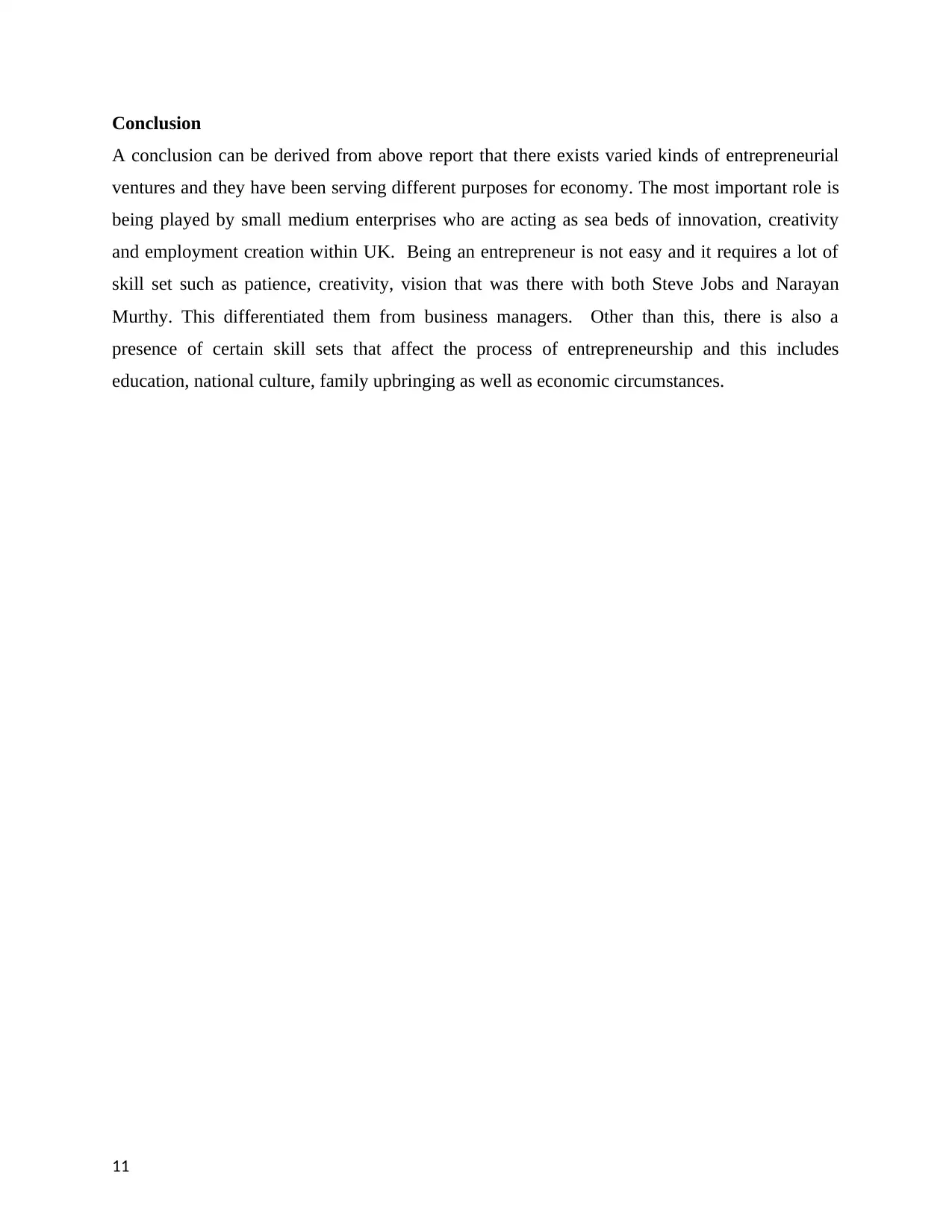
Conclusion
A conclusion can be derived from above report that there exists varied kinds of entrepreneurial
ventures and they have been serving different purposes for economy. The most important role is
being played by small medium enterprises who are acting as sea beds of innovation, creativity
and employment creation within UK. Being an entrepreneur is not easy and it requires a lot of
skill set such as patience, creativity, vision that was there with both Steve Jobs and Narayan
Murthy. This differentiated them from business managers. Other than this, there is also a
presence of certain skill sets that affect the process of entrepreneurship and this includes
education, national culture, family upbringing as well as economic circumstances.
11
A conclusion can be derived from above report that there exists varied kinds of entrepreneurial
ventures and they have been serving different purposes for economy. The most important role is
being played by small medium enterprises who are acting as sea beds of innovation, creativity
and employment creation within UK. Being an entrepreneur is not easy and it requires a lot of
skill set such as patience, creativity, vision that was there with both Steve Jobs and Narayan
Murthy. This differentiated them from business managers. Other than this, there is also a
presence of certain skill sets that affect the process of entrepreneurship and this includes
education, national culture, family upbringing as well as economic circumstances.
11
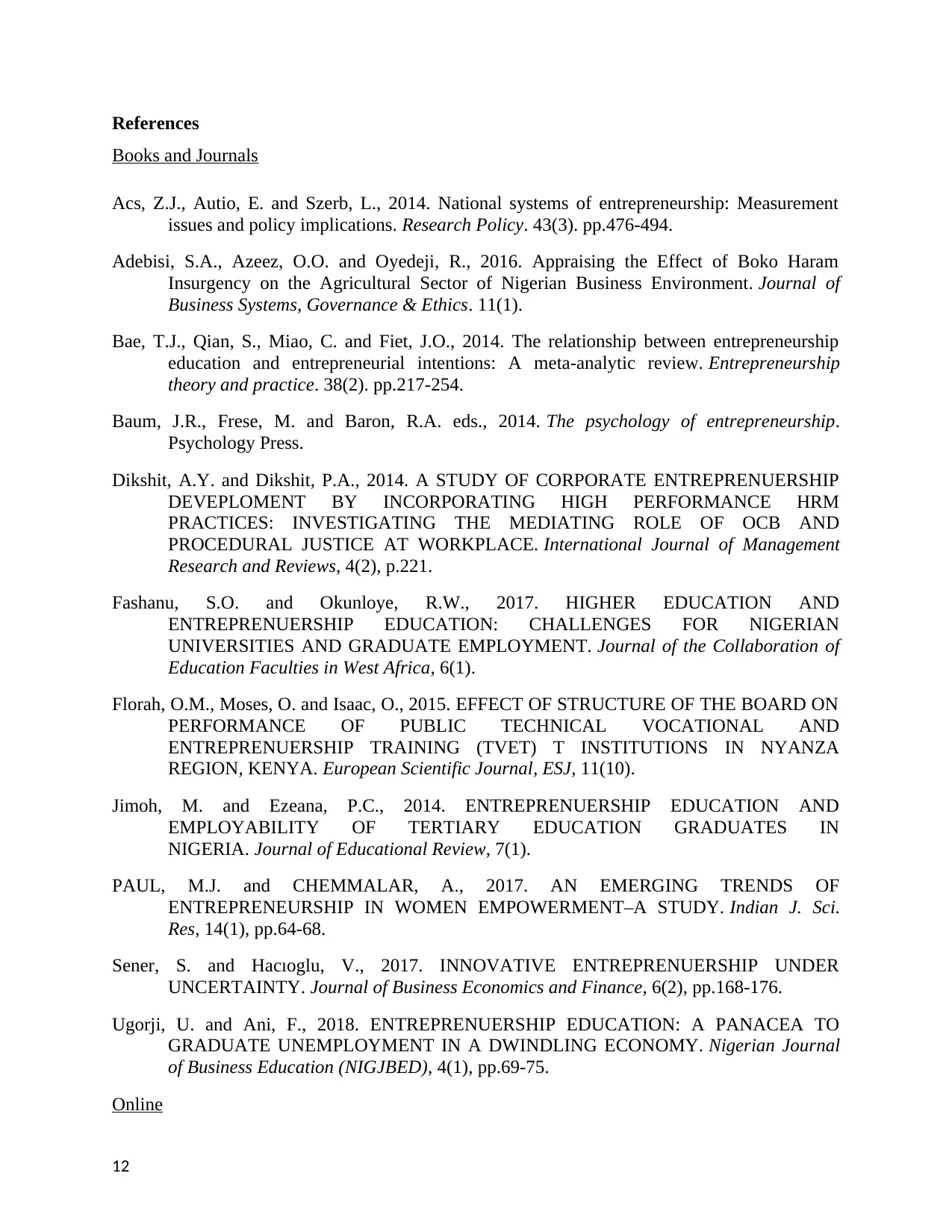
References
Books and Journals
Acs, Z.J., Autio, E. and Szerb, L., 2014. National systems of entrepreneurship: Measurement
issues and policy implications. Research Policy. 43(3). pp.476-494.
Adebisi, S.A., Azeez, O.O. and Oyedeji, R., 2016. Appraising the Effect of Boko Haram
Insurgency on the Agricultural Sector of Nigerian Business Environment. Journal of
Business Systems, Governance & Ethics. 11(1).
Bae, T.J., Qian, S., Miao, C. and Fiet, J.O., 2014. The relationship between entrepreneurship
education and entrepreneurial intentions: A meta‐analytic review. Entrepreneurship
theory and practice. 38(2). pp.217-254.
Baum, J.R., Frese, M. and Baron, R.A. eds., 2014. The psychology of entrepreneurship.
Psychology Press.
Dikshit, A.Y. and Dikshit, P.A., 2014. A STUDY OF CORPORATE ENTREPRENUERSHIP
DEVEPLOMENT BY INCORPORATING HIGH PERFORMANCE HRM
PRACTICES: INVESTIGATING THE MEDIATING ROLE OF OCB AND
PROCEDURAL JUSTICE AT WORKPLACE. International Journal of Management
Research and Reviews, 4(2), p.221.
Fashanu, S.O. and Okunloye, R.W., 2017. HIGHER EDUCATION AND
ENTREPRENUERSHIP EDUCATION: CHALLENGES FOR NIGERIAN
UNIVERSITIES AND GRADUATE EMPLOYMENT. Journal of the Collaboration of
Education Faculties in West Africa, 6(1).
Florah, O.M., Moses, O. and Isaac, O., 2015. EFFECT OF STRUCTURE OF THE BOARD ON
PERFORMANCE OF PUBLIC TECHNICAL VOCATIONAL AND
ENTREPRENUERSHIP TRAINING (TVET) T INSTITUTIONS IN NYANZA
REGION, KENYA. European Scientific Journal, ESJ, 11(10).
Jimoh, M. and Ezeana, P.C., 2014. ENTREPRENUERSHIP EDUCATION AND
EMPLOYABILITY OF TERTIARY EDUCATION GRADUATES IN
NIGERIA. Journal of Educational Review, 7(1).
PAUL, M.J. and CHEMMALAR, A., 2017. AN EMERGING TRENDS OF
ENTREPRENEURSHIP IN WOMEN EMPOWERMENT–A STUDY. Indian J. Sci.
Res, 14(1), pp.64-68.
Sener, S. and Hacıoglu, V., 2017. INNOVATIVE ENTREPRENUERSHIP UNDER
UNCERTAINTY. Journal of Business Economics and Finance, 6(2), pp.168-176.
Ugorji, U. and Ani, F., 2018. ENTREPRENUERSHIP EDUCATION: A PANACEA TO
GRADUATE UNEMPLOYMENT IN A DWINDLING ECONOMY. Nigerian Journal
of Business Education (NIGJBED), 4(1), pp.69-75.
Online
12
Books and Journals
Acs, Z.J., Autio, E. and Szerb, L., 2014. National systems of entrepreneurship: Measurement
issues and policy implications. Research Policy. 43(3). pp.476-494.
Adebisi, S.A., Azeez, O.O. and Oyedeji, R., 2016. Appraising the Effect of Boko Haram
Insurgency on the Agricultural Sector of Nigerian Business Environment. Journal of
Business Systems, Governance & Ethics. 11(1).
Bae, T.J., Qian, S., Miao, C. and Fiet, J.O., 2014. The relationship between entrepreneurship
education and entrepreneurial intentions: A meta‐analytic review. Entrepreneurship
theory and practice. 38(2). pp.217-254.
Baum, J.R., Frese, M. and Baron, R.A. eds., 2014. The psychology of entrepreneurship.
Psychology Press.
Dikshit, A.Y. and Dikshit, P.A., 2014. A STUDY OF CORPORATE ENTREPRENUERSHIP
DEVEPLOMENT BY INCORPORATING HIGH PERFORMANCE HRM
PRACTICES: INVESTIGATING THE MEDIATING ROLE OF OCB AND
PROCEDURAL JUSTICE AT WORKPLACE. International Journal of Management
Research and Reviews, 4(2), p.221.
Fashanu, S.O. and Okunloye, R.W., 2017. HIGHER EDUCATION AND
ENTREPRENUERSHIP EDUCATION: CHALLENGES FOR NIGERIAN
UNIVERSITIES AND GRADUATE EMPLOYMENT. Journal of the Collaboration of
Education Faculties in West Africa, 6(1).
Florah, O.M., Moses, O. and Isaac, O., 2015. EFFECT OF STRUCTURE OF THE BOARD ON
PERFORMANCE OF PUBLIC TECHNICAL VOCATIONAL AND
ENTREPRENUERSHIP TRAINING (TVET) T INSTITUTIONS IN NYANZA
REGION, KENYA. European Scientific Journal, ESJ, 11(10).
Jimoh, M. and Ezeana, P.C., 2014. ENTREPRENUERSHIP EDUCATION AND
EMPLOYABILITY OF TERTIARY EDUCATION GRADUATES IN
NIGERIA. Journal of Educational Review, 7(1).
PAUL, M.J. and CHEMMALAR, A., 2017. AN EMERGING TRENDS OF
ENTREPRENEURSHIP IN WOMEN EMPOWERMENT–A STUDY. Indian J. Sci.
Res, 14(1), pp.64-68.
Sener, S. and Hacıoglu, V., 2017. INNOVATIVE ENTREPRENUERSHIP UNDER
UNCERTAINTY. Journal of Business Economics and Finance, 6(2), pp.168-176.
Ugorji, U. and Ani, F., 2018. ENTREPRENUERSHIP EDUCATION: A PANACEA TO
GRADUATE UNEMPLOYMENT IN A DWINDLING ECONOMY. Nigerian Journal
of Business Education (NIGJBED), 4(1), pp.69-75.
Online
12
⊘ This is a preview!⊘
Do you want full access?
Subscribe today to unlock all pages.

Trusted by 1+ million students worldwide
1 out of 13
Related Documents
Your All-in-One AI-Powered Toolkit for Academic Success.
+13062052269
info@desklib.com
Available 24*7 on WhatsApp / Email
![[object Object]](/_next/static/media/star-bottom.7253800d.svg)
Unlock your academic potential
Copyright © 2020–2026 A2Z Services. All Rights Reserved. Developed and managed by ZUCOL.




